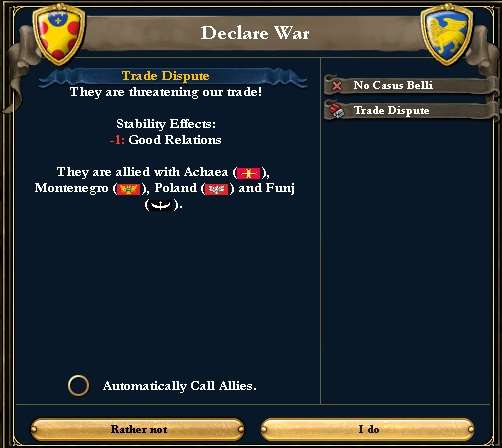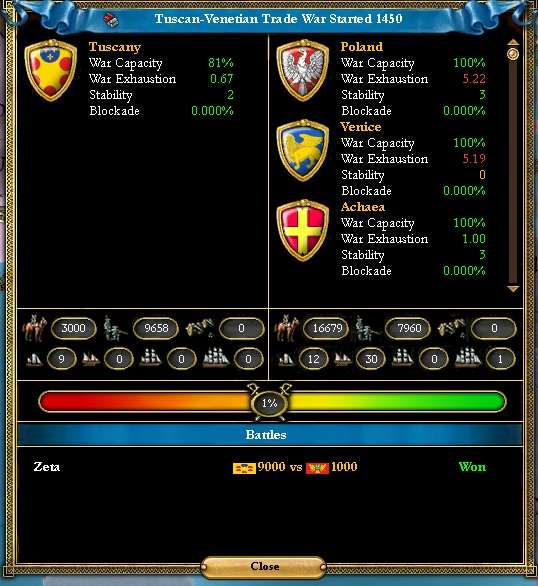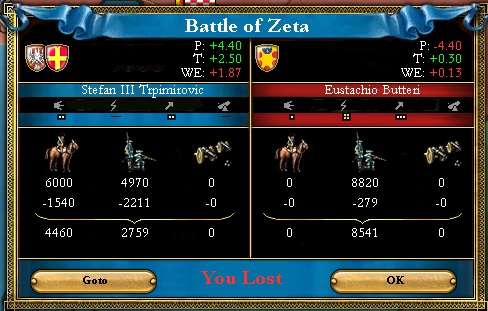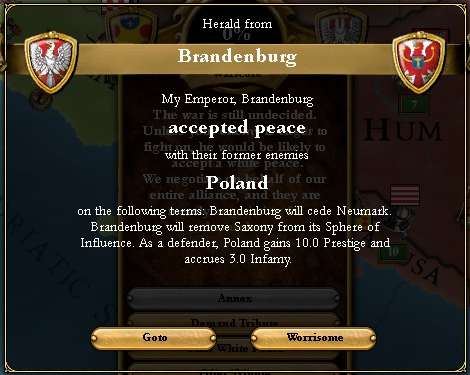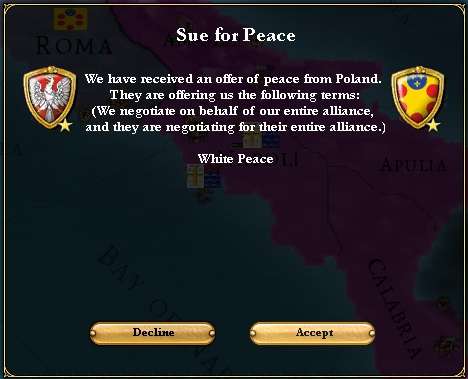Chapter 8: An unexpected opportunity
5 July 1450, the Imperial Chancellor's office
While a lot had gone on in the world, Count Constantine, Chancellor of the Tuscan Empire, had a fairly easy first year on the job; just reporting on other countries. A number of powers signed white peaces, and not too much had changed for Italy as a result. The most significant international event was England being thrown off the Continent; they held only Calais. Savoy managed to "beat" France, only because France was dealing with England. They got a little money and freed Orleans from French vassalage; it was quite the diplomatic coup.
His job wasn't easy any more, though. Emperor Julius I was annoyed with Venice, and thought that perhaps he could gain some lucrative land, as Venice was not part of the Damned German Empire. Constantine admitted his reasoning was sound; then again, he was not terribly hard to convince when it came to the Damned German Emperor. Venice had embargoed Tuscany over some silly matter; Julius I intended to use this trade dispute as a justification for war.
A month earlier, Constantine had personally gone to Montenegro; his international credibility convinced the King of Montenegro to allow Tuscany to use her lands as a staging ground. Venice had superiority in naval power; the only way to counteract that was to try to seize her Greek provinces, perhaps force Venice to the bargaining table. The first Imperial fleet, soon dubbed the First Classis, was nowhere near suitable in a fight with the preeminent Mediterranean naval power.
Julius I had recently ordered more religious schools be closed, and new state schools to replace them; by becoming more Innovative, the Emperor hoped to stimulate more research on government projects and to encourage more talented foreigners -- like Constantine himself -- to come to Tuscany. Constantine's first official text was the new decree implementing the Emperor's decision. The response from the international community was mockery -- Tuscany was a little less prestigious now, but this would be offset, both the Chancellor and the Emperor hoped, by the coming war. [1]
As Constantine prepared his second official text -- the declaration of war on Venice -- he carefully considered Venice's allies.
Funj, Achaea and Montenegro were minor regional powers; given the 9,000 Tuscan troops sitting in Montenegro, any resistance would be quickly dispersed. Venice had no army to speak of. Poland, while mighty, had no direct access to Tuscany; Constantine didn't think the First Legion would even see a single Polish soldier. He presented the declaration to the Emperor for signature; it would likely not be dispatched until the following day. Constantine was a little worried; this all seemed a little too easy.
--------------------------------------------------------------------------------------------------
8 October 1450, the Imperial Throne Room
Julius I was not a happy man. It turned out Poland had plenty of allies of her own, and had called in Croatia, Ragusa, Serbia Transylvania, and Wallachia. Brandenburg had offered an alliance to Tuscany; he accepted it, but needed to wait to officially call them into the war until another diplomat could be found. He'd already called Naples.
The war now had a slightly different picture; in theater, the forces of the Empire were now outnumbered.
A balance of sheet of the forces involved prior to the entry of Naples
Luckily, General Butterius had quality defensive ground; if he could hold, perhaps many of the allies would lose interest. 4,000 soldiers stayed behind to protect the Imperial capital. War was now well and truly joined.
--------------------------------------------------------------------------------------------------
20 November 1450, the command tent of General Eustachio Butterius, Zeta, Montenegro
The General cursed. Although the First Legion had gotten off lightly, in terms of casualties, he'd left the cavalry behind as part of the home guard and could not pursue the enemy -- the battle was a strategic victory but a tactical defeat.
He planned to escape towards Ragusa; there, he could prepare for a defensive battle and begin sieging enemy territory. If he had to, he would eliminate each enemy nation one at a time.
--------------------------------------------------------------------------------------------------
1 July 1451, the Imperial Throne Room
The war had already lasted just short of one year. Although Emperor Julius I had enjoyed the brief fealty ceremony with the former King of Ragusa, he was nonetheless concerned. General Butterius simply had too many enemies to fight, and Milan refused to answer the call of the Tuscan Empire. Brandenburg had eagerly jumped into the war and inflicted some defeats on the Polish army, but already they were being beaten back.
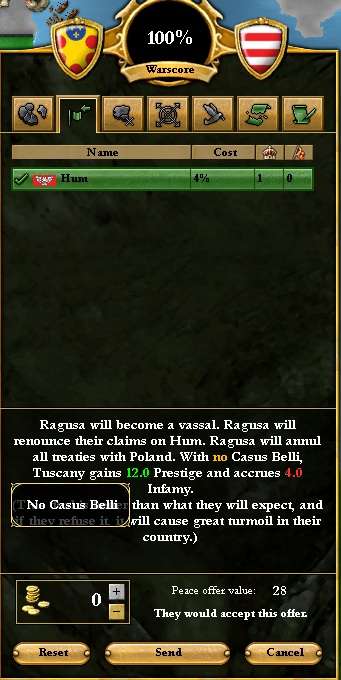
Julius could not help but wonder what his father would have done in this situation. He felt certain that Leo I's sheer force of will would have sent the Venetians running for their lives. Marshal Cato would have laughed at those odds, somehow flanked them all, and been home in time for lunch. Truly, this was an era of lesser men. At least he had Chancellor Constantine, who had proven to be every bit as shrewd as his predecessor; he hoped Cicero was enjoying his well earned retirement. Syracusa was little help; the Empress constantly fought with the Dowager Empress Lucia over how best raise to the young heir to the throne, Gian. Gian clearly had no interest in ruling; he was indifferent to all of his lessons, save mathematics -- even there he was well below average. No matter -- he must make do with the tools at hand.
--------------------------------------------------------------------------------------------------
14 December 1451, the Chancellor's office
Constantine had already read two reports that day that made him feel ill. The war was not going well. One of Butterius' scouts had slipped through the Venetian blockade and delivered a sketch of the strategic situation.
The General was outnumbered severely -- nearly three to one! There must have been serious arguments over who would get the credit for defeating General Butterius, for none of the armies had made even a slight move toward engaging the First Legion. Constantine had shrewdly signed an alliance with Ragusa but not called them to battle; perhaps they feared the consequences of agitating a neutral party? Nevertheless, it was at best a stalemate -- the rules of war dictated that white peaces would automatically be signed if three years passed with no fighting; this was the Empire's best chance for a peace at this stage of the war.
The second document was blacker still -- the terms of the Brandenburg treaty with Poland.
Brandenburg only had four provinces to begin with; surely the loss of even one was crippling. Brandenburg even lost the right to influence Saxony; a small but strategic country, as it was one of the electors to the Damned German Empire.
The Chancellor had been to see Cicero in Romagna; Cicero had never looked so happy. When he asked Cicero for advice, however, his expression darkened. The Duke of Romagna simply shook his head. Whether that meant he had no advice, he advice but refused to give it, or whether the situation was just hopeless, Constantine left without any new insights. Perhaps the new year would provide a change in the situation.
--------------------------------------------------------------------------------------------------
19 April 1452, Austria
Agrippa Tullius Cicero, the Duke of Ancona and son of the former Chancellor, was named Ambassador to Austria shortly before his father's retirement. While nowhere near the brilliant speaker and diplomat his father was, Agrippa did know how to follow directions, and was naturally considered loyal to the Imperial Throne. Constantine kept him in the office, partially because he was still quite new to the job, but also because Agrippa had valuable contacts in the Austrian embassy. That many of his contacts tended to be female was, as he repeatedly insisted, purely coincidental. In any event, this was a ceremonial occasion, or so he had been told. He was on the way to Vienna, to meet with Leopold VIII (when asked why the successor to Leopold VIII was also Leopold VIII, the running Tuscan joke was that they just didn't understand Roman numerals), Emperor of Austria.
Before he could get to Vienna, however, Agrippa was halted by two men wearing the livery of the House of Valois. [2] "Duke Cicero? We have been ordered by His Excellency, the Holy Roman Emperor Leopold VIII, to see that you are given safe passage home. Austria has honored her fraternal bonds with Poland and is now in a state of war with Tuscany. Bosnia and Sicily will soon deliver declarations of their own, at Leopold VIII's insistence."
Agrippa was absolutely stunned. He'd had no warning from any of his contacts. This war was rapidly appearing to be a lost cause. Nevertheless, he turned his carriage around and headed to the nearest ship sailing back for Tuscany. His last thought, as he left Austria, was that he probably should not have rendezvoused with that Minister's wife...
-------------------------------------------------------------------------------------------------
21 May 1452, the home of Gian Gastone del Moro
The diplomat had looked for days, ever since the Austrian army had crossed into Tuscany by way of Ferrara. He'd been personally tasked with finding a suitable leader for the home guard of 4,000. Many nobles simply had no military experience, but those who did were already in the First Legion overseas. del Moro's father was a Baron from Pisa; Gian Gastone (he always insisted on both names) had chosen the life of a mercenary, eschewing his nobility. He did not want anything to do with power, wealth, or luxuries he did not earn. All of these qualities endeared him to Julius I. There was a certain unease with officers of common birth; del Moro was the best of both worlds, simultaneously noble and yet with an air of the common man about him.
The diplomat knocked on the door, and found del Moro himself standing before him. An enormous man -- nearly 250 pounds of solid muscle -- the diplomat was absolutely terrified. Quivering, he handed the letter and gold he was instructed to deliver over to del Moro.
Signore del Moro,
Word has traveled far and wide of your skill with a blade, as well as your skill with an army. My diplomat, to whom you are now speaking, is offering you a commission as General of the Home Guard; at the conclusion of this war, you will be given a full Legion. The gold is a gift; even if you choose not to accept, you may keep it. I know of your distaste for land and wealth you have not earned; I assure you, if this war is victorious, you will have earned immeasurable quantities of both. If you agree, please ride for Florence as quickly as possible; my diplomat will see to your every need.
Julius I, Emperor of Tuscany and King of Naples
Gian Gastone del Moro thought briefly about his father -- a Baron of minor consequence who'd only even gotten that by knocking up the third cousin of another Baron. He smiled like a wolf -- he knew this was an opportunity to make the del Moro name famous throughout the world! As he pumped the poor diplomat's hands, he grabbed his sword and shield and headed for Florence. He would have a very tough task ahead of him, as the Austrians were some of the finest soldiers in the world, and he would be outnumbered at least two to one.
Just the way he liked it.
-------------------------------------------------------------------------------------------------
18 December 1452, General del Moro's camp outside Florence
The new General was puzzled by Austria's behavior. They'd marched in and out of Romagna at least a dozen times, with nearly 35,000 soldiers, yet had not once even threatened an attack. He wondered if perhaps Austria had only done this to preserve relations with Poland, for their hearts did not seem to be in it. Milan had finally come around to potentially entering the war; they'd recently become Papal Controller, so with luck, Tuscany would not be alone.
As General del Moro studied the ground around him, making sure he was in the best possible defensive position, a rider in Austrian white entered his camp. He saluted the General crisply, and handed him a note. The General returned the salute, was absolutely dumbfounded, but nonetheless nodded quickly. Motioning to his second in command, he put the young captain in charge; he was going to proceed to the Imperial palace to hand-deliver the message.
A few minutes later, the General arrived at the Imperial Palace. Chancellor Constantine and Emperor Julius I were discussing the best approach to get Milan into the war. The General cleared his throat, and when he had their attention, handed them the note he'd received.
The Emperor cocked his head to one side, then the other. He passed it along to Constantine, who looked equally quizzical. "General, you received this from a properly credited Austrian representative, yes? You verified his bona fides?"
"Of course, Emperor Julius. I personally vetted him, and he is the youngest son of Leopold VIII. I am certain that Leopold would not have left us such a valuable hostage if he were not serious."
Constantine looked extremely agitated. "It must be a trick, your Imperial Majesty! The Damned German Emperor is obviously planning some kind of ambush, and we would be fools to be taken in."
The Emperor chuckled, then shook his head. "From the reports the General has been sending to us, Leopold needed no ambush -- he could have been inside our walls months ago, and yet he did not. Although he asks for the entire Imperial treasury, it would be an extremely cheap way to get rid of a formidable opponent. I am inclined to accept. What say you, Chancellor?"
The Chancellor's eyes narrowed, but then he began to smile. "General, forgive me, but what have you heard of Naples?"
del Moro looked puzzled. "I know they've got a reasonably well trained army, but they've lacked an opportunity to get involved."
Constantine smiled even wider. "My Emperor, General, we have a tremendous opportunity here. Austria's allies were bound to answer her call -- yet, the allies would be left alone in this instance, since the Poles are alliance leader."
The Emperor finally got it. "Allies... like Sicily?"
"Indeed, my Emperor."
Julius I positively cackled with delight. "General, begin planning for an invasion of Sicily; I am sure my subjects in Naples would be happy to assist. Chancellor, prepare our official acceptance letter; try to sound as humble as possible."
In one fell swoop, what could have been a crushing defeat became a truly glorious moment for Tuscany -- perhaps this war had not been a mistake after all!
--------------------------------------------------------------------------------------------------
16 October 1453, aboard a transport ship in the Gulf of Taranto
Much had happened in the past few months. General del Moro of the Home Guard had, without warning, become General del Moro of the Legio I 'Imperator'. General Butterius had died of some disease on the battlefield -- cholera was the most likely candidate. del Moro knew and respected Butterius, particularly as he had earned his title of Duke of Siena the old fashioned way; through conquest.
One after another, the allies of Poland and Venice had come to the bargaining table, all seeking white peace. All were accepted; with Venice out of the picture, the mighty Classis I would have command of the sea, and the others freed the First Legion to lead the invasion. Poland had no intention of seriously assisting in the war, they had come to realize. Tuscany had lost one ally, as Milan refused to answer the Empire's call, but gained a new one in Lithuania -- although not as mighty as she once was, Lithuania could distract Poland in the event of Polish invasion.
Poland and Sicily remained alone arrayed against Tuscany and Naples. With superiority at sea, his plan was simplicity itself. The Neapolitans were waiting for the signal in Calabria; after taking Palermo, del Moro would take the first Legion and trap the 7,000 men of the King of Sicily in a classic pincer movement, with Naples crossing the straits of Messina. Malta would be captured by the troops of the former Home Guard.
Poland would ultimately have to sign a peace; they had no way to invade Tuscany.
--------------------------------------------------------------------------------------------------
10 August 1454, the battlefield of Messina
It was a glorious day! del Moro's plan had worked perfectly. The victory was not bloodless -- his battle report showed the names of many brave Tuscan and Neapolitan soldiers. But for all intents and purposes, the Battle of Messina, considered the greatest of what historians later called the Great Trade War, eliminated Sicilian resistance. It was only a matter of time before the forts crumbled. 9 days after his glorious victory, Messina collapsed, and Sicily was added to the Empire of Tuscany.
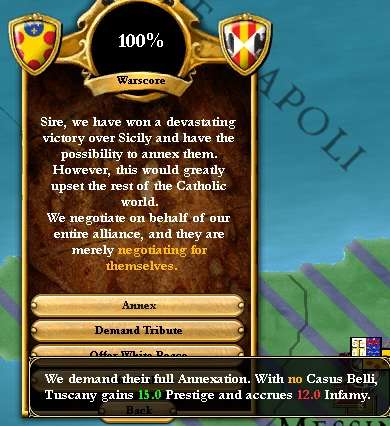
The strategic island of Malta was also added to Tuscany; Sicily had expanded earlier in the 14th century. For his efforts, the Emperor personally came to his camp, knighted him as a Commander of the Order of the Tuscan Empire, and named him Duke of Sicily. The now-Duke General Gian Gastone del Moro was overjoyed; his sons finally had land to call their own, and a lovely climate it was too. Emperor Julius I was pleased because he now had loyal Dukes he could trust governing every province. The late General Butterius' land was given to his wife, to hold until her son was old enough to hold the office. The young lad, born while Butterius was at war with Siena, was named Lucius, after the Dowager Empress. He had wanted to name him Julius, but the Emperor had objected vociferously.
It was only a matter of time before Tuscany would be at peace again, able to enjoy the fruits of her labor.
--------------------------------------------------------------------------------------------------
1 January 1455, a small cemetery outside Constantinople
Emperor Julius I had finally left Italy for the first time in his life. As they sailed up the Hellespont, the twinkling glory of the former capital of the Roman Empire seemed to beckon to Julius. In some ways, it was as if Rome had never died. There were tell-tale signs that all was not well, however. The Ottoman Empire was a direct threat to Byzantine prosperity; most of the former lands of Byzantium were under Ottoman rule now. He silently vowed to someday to chase the Turk out of Europe, as was his destiny, and to reunite the capitals of the Ancient Roman Empire under the flag of one country again.
He was not here to sight see, however. The war was more or less completed; Poland continued to hold out, but the offers had gotten more and more reasonable. A white peace was surely just around the corner. Constantine, missing the family and friends he'd left behind, had requested a brief leave of absence. The Emperor without hesitation agreed; he'd lent him one of his personal sailing vessels for the trip. Unfortunately, the ship had struck a rock on the way to the harbor, and all hands aboard had drowned, including the Chancellor.
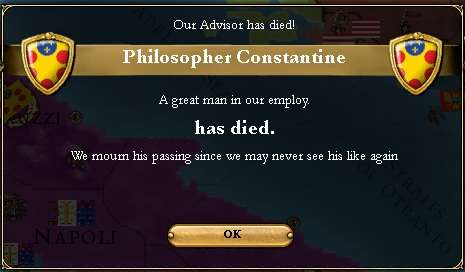
The Emperor's speech at the funeral was moving, and brought Constantine's friends to tears. Julius even met his wife; nobody had ever mentioned a wife to him before, let alone four children, three sons and a daughter! Constantine had given up far more than he let on when he sailed for Tuscany. Julius placed the treasury of the Empire of Tuscany at their disposal; he even offered to settle them in Tuscan lands, if they wanted to. Nobody yet considered the offer, but Julius had a feeling that he had not heard of the Greeks for the last time. He had one final mission; he officially acknowledged Constantine as a Tuscan citizen. The late chancellor and his family were officially members of the Graecus
gens, or clan. The Emperor personally chiseled his full name on the tombstone.
Imperial Chancellor Constantine Graecus Scholasticus, Chancellor of the New Roman Empire
The Emperor could not dally in Constantinople, and after a few hours, returned home on the ship which brought him. He still had official business to conduct.
--------------------------------------------------------------------------------------------------
1 January 1456, the Chancellor's office
He couldn't believe that he'd agreed to do this again. Marcus Tullius Cicero, Duke of Romagna, was now Imperial Chancellor. The Emperor had hired a bright young Army Reformer named Filippo del Rosso [3] to take Constantine's place on the council, but had acted as his own Chancellor for the past year. Cicero was already in his seventies, but was as sharp as ever, although he relied on young assistants to handle the day to day busy work that once consumed him. Cicero was Chancellor in name only, but Julius valued his advice and felt at ease with Cicero to rely upon. Cicero agreed to the job for one year, and he would train his eventual replacement -- Sextus Porcius Cato, son of the former Marshal of the Empire.
Julius had honestly thought that Marcus would choose his own son, but Agrippa had never shown much commitment to any particular profession; he did ensure that, if nothing else, the name Cicero would never die out. He had eleven legitimate and who knows how many illegitimate children; Sextus, on the other hand, had briefly considered the priesthood before Emperor Leo had issued the Restraint of Appeals.
Sextus was uncommonly serious, fluent in at least as many languages as Cicero, and a remarkably hard worker. Julius had to admit, Sextus was a fine choice, and agreed to Cicero's conditions. Julius even bribed Cicero, so to speak, by ensuring his son would inherit both Ancona and Romagna; later Julius remarked that he'd bought the year of Cicero's service cheaply.
Cicero's first act was formal, but a long time in coming -- an official peace treaty with the King of Poland.
Cicero was thankful this war was over; some of his grandchildren were almost military age.
Before he could leave his office for the evening, though, he picked up one announcement that vaguely troubled him, although he couldn't quite figure out why. Why should anybody care who had become controller of the Papacy, especially if it was a tiny weak nation like Venice? Still, Cicero briefly considered bringing it to the Emperor's attention before dismissing the thought. What could Venice possibly do to Tuscany?
--------------------------------------------------------------------------------------------------
[1] Officially, -5 prestige.
[2] I didn't catch when, but somehow, the Valois became the house of Austria, not the Habsburgs.
[3] He's a level 3 Army Reformer.
The next update for this one will be next week -- it might get broken into two parts, but I haven't decided yet.


